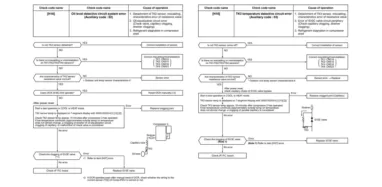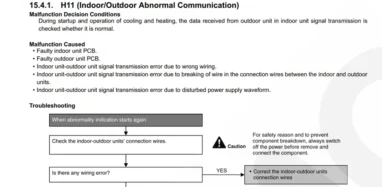Among many inventions and discoveries of science and technology, the air conditioner is another revolutionary invention. People assume that the air conditioner uses water for its functioning and working. People think so because of the leakage of water or drainage of water from the outdoor unit.
Residential air conditioners do not use water but some commercial HVAC units did use water. Commercial air conditioners are different from residential air conditioners as they are costly and difficult to maintain.
Role of air conditioner:
The role of the air conditioner in your home is to cool the room and the second job is to dehumidify your home by draining water outside the house.
Humid air actually contains more water content it so the use of an air conditioner helps to remove this extra water content by draining it outside. For your good health and comfort level of humidity should be maintained at an optimum value. Removing humidity is necessary for health as well as other purposes like to avoid the formation of molds in your home and to remove unpleasant smell.
How air conditioners drain water?
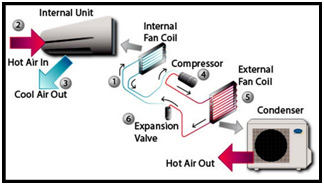
Step 1:
In the 1st step, your air conditioner will pull the humid air of the room or house into the indoor unit from where it will be blown over evaporator coils
Step 2:
They use refrigerant that will absorb heat from that humid air and move it outside of the unit.
Step 3:
Evaporator coils will make the water in the humid air gathers on the coil and then it will drip into a pan that is placed below evaporator coils.
Step 4:
After gathering condensate line will drain it out of your home.
Point to ponder!
If your indoor AC unit is draining water then it indicate an issue with your air conditioner system.
- Damaged drain pan
- Blocked condensate line
- Leakage of refrigerant
- Damage of condensate pump
How much water should drain from air conditioner?
You will observe that these water-based or water-cooled units are not effective in terms of energy and cost for the homeowners. That’s why residential air conditioners like window units are more practical nowadays.
According to an estimate 720,000 gallons of water is used by water cooled air conditioners every year.
Humid air contains heat energy and is quite difficult to cool. In arid and dry climate areas usually 5 gallons per day and in humid and moist areas usually 20 gallons per day is expected to be normal drainage.
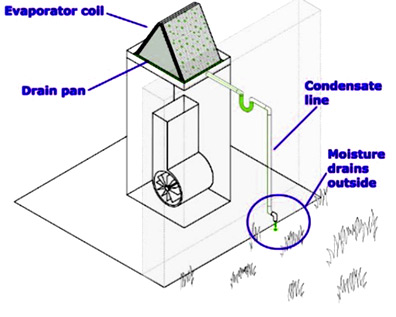
But residential air conditioners don’t need water for air cooling purpose.
Does HVAC use water?
What is HVAC ?
Heating, ventilating, and air conditioning system is now an important part of residential buildings, commercial buildings, and industrial buildings.
Heating :
If you aim to heat the room, they provide heating system using radiators.
Ventilating :
Its job is to maintain clean air inside the area or room and help to keep the polluted air out of the area and room. It maintains the circulation of inner air by using fans.
Air conditioning :
It will remove humidity from air and lowers its temperature using air or water based cooling system.
HVAC provides following range of different factors :
- Temperature 75 ˚F
- Humidity 40-60 %
- Carbon dioxide less than 1000 ppm
- Ventilation 62.0 ASHRAE
Types of HVAC system :
Centralized :
A single system that is located in a single area. It fulfills the HVAC need of the building using water as well as accompanied by air.
| Advantages | Disadvantages |
| Easy to control | Expensive |
| Greater potential | Sophisticated |
| Difficult to maintain |
Packaged :
Buildings that lack adequate space use this system.
Components :
- One unit containing air conditioner and evaporator
- Thermostat interface available for complete control
- Optional improvers for air quality like air purifier, ventilator, UV lamps.
Individual :
Composed of various individual units installed in various parts of building for example air conditioner for rooms.
| Advantages | Disadvantages |
| Cost efficient | Difficult to maintain in large buildings |
| Easy to control |
Boilers and water heaters are actually HVAC systems and they obviously require water. They use water as a medium for cooling and heating indoor air.
Does shutting off water effect AC?
No, it actually does not affect air conditioners because usually, residential air conditioners are not water-based. So they will not be affected. As these residential air conditioners are not connected to the drain line because they do not use water so they have are not affected by the shutting off water.
But HVAC system that uses water and is connected to drain line will be severely affected by the shuttering of water.
Water-based air conditioner
As we know the air conditioners used in the past use refrigerants for cooling purposes that are not eco-friendly. So nowadays water-based air conditioner systems are introduced that can cool air up to 18˚ C without using harmful chemicals and an energy-intense compressor.
This technology is pacing nowadays and replacing the air cooling principle. As it does not use harmful chemicals like chlorofluorocarbon and hydrochlorofluorocarbon. So they are becoming eco-friendly.
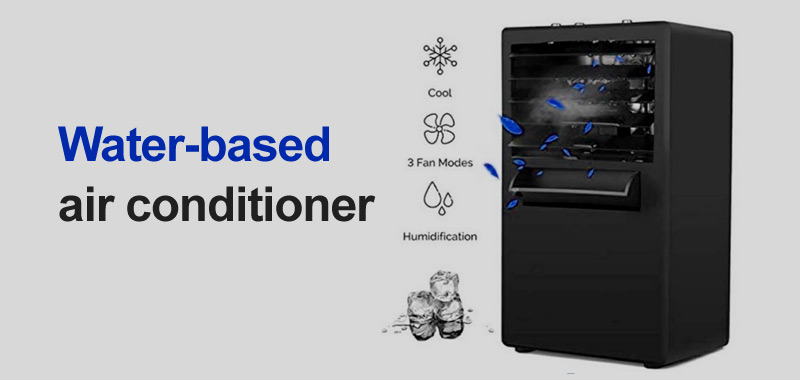
Types of units that use water:
- Tube-within-a-tube
- The shell and the coil
- The shell and the tube
Features :
- Use of water
- Efficient
Tube within a tube :
Its design will be like a large tube that contain a smaller tube in it.
Working :
Water flow from smaller tube and cools the refrigerant that is running in larger tube.
Advantages :
- Cheap
- Max heat exchange
- Most desired
The shell and the coil :
There will be a coil surrounded by or enclosed in a shell.
Working :
Almost the same as mentioned above water will be running through the coil and refrigerant will be present in the shell and cause the exchange of heat between water and refrigerant.
The shell and the tube :
A number of small tubes made up of copper are enclosed in a shell that contains refrigerant and water passes through these tubes and cools the refrigerant.
Features :
- Expensive
- Used for higher capacity unit
